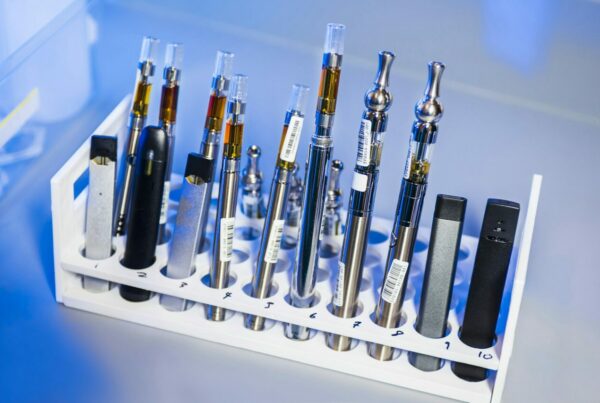N, N-Dimethyltryptamine (DMT) is a compound commonly found in both plants and animals, known for its potent yet short-lived psychedelic effects upon ingestion.
Evolving research suggests that DMT, naturally present in the body, plays important roles in the peripheral and central nervous systems, potentially acting as a neurotransmitter.
DMT can trigger intense psychedelic experiences, but it generally doesn’t result in many negative effects, except for possible cardiovascular issues when administered in large amounts through injection.
Let’s explore DMT and its diverse functions. These include recreational use and its promising potential in scientific research and therapeutic practices.

DMT: A Brief Introduction
| Feature | Description |
| Name | N, N-Dimethyltryptamine (DMT) |
| Type | Indole alkaloid |
| Existence | Naturally found in a variety of plants and animals |
| Psychoactive Effects | Creates brief, powerful psychedelic experiences when ingested. |
| Consumption Method | Can be smoked, injected, or consumed orally. |
| Effect Duration | Short duration, usually between 5 to 30 minutes. |
| Chemical Structure | Comprises of a tryptamine core with two methyl groups attached to the amine nitrogen atom. |
| Metabolism | Rapidly metabolized by the body, decomposed by monoamine oxidase (MAO). |
| Historical Use | Traditionally used in diverse ceremonial and shamanic rituals by indigenous cultures. |
| Alternate Names | Dimitrifantasiabusinessman’s tripBusinessman’s special45-minute psychosisspiritual molecule |
The Role of DMT in Mental Health
N, N-Dimethyltryptamine (DMT), a compound famous for its powerful psychedelic effects, is gaining attention for its potential benefits to mental health. Despite its common association with intense visionary experiences, recent research suggests a connection between DMT and mental wellness.
Effects on Psychological and Emotional Mental Wellness
DMT, known for its psychedelic effects, induces profound emotional reactions and alters states of consciousness. This has the potential to provide therapeutic avenues for addressing mental health problems, facilitating emotional processing, and offering new perspectives on personal traumas.
Neuroplasticity and Brain Function
Research shows that DMT may impact neuroplasticity, thereby enhancing the brain’s ability to adjust and remodel. Studying its influence on synaptic plasticity and neural connectivity could yield potential treatments for conditions resulting from neural misalignment.
Potential Therapeutic Applications for Mental Health Disorders
Initial studies show DMT’s potential for treating disorders such as depression, addiction, and PTSD. Its ability to induce mystical or spiritual experiences could offer a novel approach to psychotherapy, aiding in the restructuring of negative thought cycles.
The investigation of DMT’s natural presence within the body underscores its role in mental health resilience, stress response, and overall psychological health. Understanding how the body regulates internal DMT levels may lay the groundwork for future therapeutic strategies.
DMT and Mental Health Disorders
| Mental Health Disorder | Description | Effectiveness of DMT | Advantages |
| Depression | A mood disorder characterized by persistent sadness, lack of interest, and decreased motivation | Preliminary research suggests DMT may relieve symptoms by stimulating intense emotional experiences. | Its rapid onset and ability to induce transformative experiences may provide novel therapeutic approaches for altering negative thinking patterns and enhancing emotional processing |
| Post-Traumatic Stress Disorder (PTSD) | A mental health condition triggered by traumatic events, resulting in flashbacks, extreme anxiety, and intrusive thoughts | Early studies indicate DMT’s potential in managing symptoms by inducing spiritual or mystical experiences, which could help patients reframe traumatic memories | DMT’s potential to induce altered states of consciousness may aid in emotional processing and offer a fresh perspective on traumatic experiences |
| Addiction | A complex disorder marked by compulsive engagement in rewarding stimuli, despite adverse consequences | Some research suggests DMT may disrupt addictive patterns and reduce substance cravings | DMT’s ability to provoke intense and transformative experiences could help individuals modify their behavioural patterns and confront their addiction issues |
Approaches to DMT Usage
DMT, renowned for triggering short but powerful psychedelic trips, can be utilized in different manners. The chosen method of use often hinges on the desired intensity and duration of the effect.
Inhalation:
DMT, when inhaled through a pipe or vaporizer, needs careful temperature control to avoid the substance from overheating and burning. The psychedelic experience happens almost instantly when DMT is inhaled, usually lasting from 5 to 15 minutes.
Oral Consumption:
Oral consumption of DMT leads to slower-acting effects that endure considerably longer, often several hours. This is due to the gradual metabolism of DMT when mixed with an MAOI.
Intravenous Application:
DMT can be injected directly into the bloodstream for quick and intense effects.
This approach results in a fast and powerful experience, but it necessitates precise dosing and carries higher risks.
Insufflation (Snorting):
Snorting DMT results in slower-acting effects compared to inhalation but might provide a more extended experience.
Sublingual or Buccal Use:
When absorbed through the tissues in the mouth, this method offers an alternative to inhalation and delivers a longer, though less intense, experience.
Determining Therapeutic Dosage: N, N-Dimethyltryptamine (DMT)
For inhalation, the suggested dosage ranges from 20 to 40 mg, while for intravenous application, the recommended dosage is 0.2 to 0.4 mg per kg of body weight. These dosage recommendations are primarily intended for clinical research and are particularly pertinent for intravenous application.
- Intravenous use of higher doses is associated with intense visuals, temporary loss of control, and a combined state of anxiety and euphoria
- Interestingly, lower doses have demonstrated less satisfactory effects
- Recreational doses of inhaled DMT usually range from 40 to 50 mg, sometimes even reaching up to 100 mg
- Diverse doses of intravenous People have reported substantial and enduring enhancements in mental health following near-death experiences associated with DMT (7, 14, 18, and 20 mg solutions).
Availability of DMT
ProductsOsmosis – 4-ACO-DMT Ethereal Essence Tincture
This tincture is claimed to contain 4-Acetoxy-N, N-dimethyltryptamine (4-AcO-DMT), a DMT variant. Tinctures, which are liquid extracts designed for oral use, provide a different experience compared to conventional DMT.
Lucid Supply Co. – 5-MeO DMT Vaporizer
This product is a vaporizer that delivers 5-Methoxy-N, N-dimethyltryptamine (5-MeO-DMT), known for its potent, life-changing, and often brief experiences.
Integral Alchemist – Acacia – 1ml DMT Vape Cartridge
Integral Alchemist’s DMT vape cartridge is pre-filled with N, N-Dimethyltryptamine, catering to those who favor a discrete and convenient way of DMT ingestion.
Deadhead Chemist – 5-MeO-DMT Cartridge
This cartridge holds 5-Methoxy-N, N-dimethyltryptamine (5-MeO-DMT), a substance notable for its deep and powerful impact.
The potential benefits to mental health could be linked to personal growth, spiritual experiences or therapeutic applications aimed at enhancing emotional well-being.
Deadhead Chemist – N, N DMT Cartridge
Another offering from Deadhead Chemist, this cartridge contains the traditional N, N-Dimethyltryptamine. Cartridges provide a user-friendly approach to DMT consumption, ensuring a more consistent and controlled experience.
Concluding Remarks
The use of N, N-Dimethyltryptamine (DMT) in
How can I safely explore DMT products?
Responsible exploration of DMT products is recommended, with trusted sources such as Buy Dmt Canada Online Dispensary providing guidance and a variety of options.
The complex and exhilarating journey of mental health therapy is intriguing. The substance’s ability to elicit powerful, yet ephemeral, psychedelic experiences opens the door to innovative therapeutic approaches.
Preliminary studies hint at its potential for emotional processing, self-improvement, and perhaps
Mental health therapy’s substantial impact necessitates careful consideration and judicious usage.
Frequently Asked Questions:
How do different DMT products affect mental health?
For instance, vaporizers might offer immediate effects, but tinctures or vape cartridges may provide steadier and more consistent doses.
Adding derivative substances or 5-MeO-DMT can result in varying intensity levels and diverse mental health effects.
These minor variations underscore the importance of selecting a DMT product in line with your personal needs and mental health goals.
Can DMT induce lasting changes in mental health and personal growth?
There are anecdotal reports indicating that DMT-induced experiences could contribute to enduring improvements in mental health and self-development.
Deeply moving or transformative experiences, such as those akin to near-death experiences, are frequently associated with ongoing positive changes in psychological wellbeing and self-improvement.
While these experiences are powerful and transient, they often prompt introspection, spiritual revelations, and a sense of unity or enlightenment.
Following these experiences, individuals commonly report a refreshed perspective on life, improved emotional resilience, and an enhanced appreciation for existence.
What’s the best way to use DMT for mental health?
It’s essential to make well-informed decisions, which involves thorough research and comprehension of the substance’s effects.
Advice from mental health professionals or seasoned users can provide valuable perspective on potential risks and advantages.
Understanding individual tolerance and mental preparedness is equally crucial, as is creating a supportive and safe setting for the experience.
How does DMT fare against other psychedelic therapies such as psilocybin or LSD in mental health treatments?
DMT’s effects, length, and intensity vary when compared to other psychedelics like psilocybin or LSD. It’s particularly noted for its brief duration.
High-intensity, short-acting psychedelics like DMT necessitate unique therapeutic strategies in mental health, different from those implemented for longer-lasting psychedelics.
Recommended Additional Reading:

 click here.
click here.



